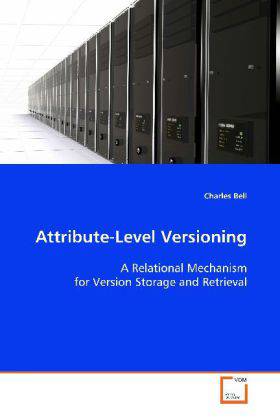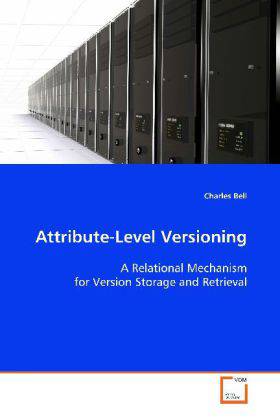
- Afhalen na 1 uur in een winkel met voorraad
- Gratis thuislevering in België vanaf € 30
- Ruim aanbod met 7 miljoen producten
- Afhalen na 1 uur in een winkel met voorraad
- Gratis thuislevering in België vanaf € 30
- Ruim aanbod met 7 miljoen producten
Zoeken
Attribute-Level Versioning
A Relational Mechanism for Version Storage and Retrieval
Charles Bell
Paperback | Engels
€ 77,95
+ 155 punten
Omschrijving
Data analysts today have at their disposal a
seemingly endless
supply of data and repositories (datasets) from which
to draw. New
datasets become available daily thus making the
choice of which
dataset to use difficult. Furthermore, traditional
data analysis has
been conducted using structured data repositories
such as relational
database management systems (RDBMS). These systems
prohibit
duplication for indexed collections forcing analysts
to choose one
value for each of the available attributes for an
item in the
collection. These variances, or versions of
attribute values,
contribute meaning to the evolution and analysis of
the entity and
its relationship to other entities. A new, distinct
storage and retrieval
mechanism will enable analysts to efficiently store,
analyze, and
retrieve the attribute versions without unnecessary
complexity or
additional alterations of the original or derived
dataset schemas.
This work presents technologies and innovations that
assist data
analysts in discovering meaning within their data
while preserving
all of the original data for every entity in the RDBMS.
seemingly endless
supply of data and repositories (datasets) from which
to draw. New
datasets become available daily thus making the
choice of which
dataset to use difficult. Furthermore, traditional
data analysis has
been conducted using structured data repositories
such as relational
database management systems (RDBMS). These systems
prohibit
duplication for indexed collections forcing analysts
to choose one
value for each of the available attributes for an
item in the
collection. These variances, or versions of
attribute values,
contribute meaning to the evolution and analysis of
the entity and
its relationship to other entities. A new, distinct
storage and retrieval
mechanism will enable analysts to efficiently store,
analyze, and
retrieve the attribute versions without unnecessary
complexity or
additional alterations of the original or derived
dataset schemas.
This work presents technologies and innovations that
assist data
analysts in discovering meaning within their data
while preserving
all of the original data for every entity in the RDBMS.
Specificaties
Betrokkenen
- Auteur(s):
- Uitgeverij:
Inhoud
- Aantal bladzijden:
- 388
- Taal:
- Engels
Eigenschappen
- Productcode (EAN):
- 9783639119992
- Uitvoering:
- Paperback
- Afmetingen:
- 220

Alleen bij Standaard Boekhandel
+ 155 punten op je klantenkaart van Standaard Boekhandel
Beoordelingen
We publiceren alleen reviews die voldoen aan de voorwaarden voor reviews. Bekijk onze voorwaarden voor reviews.







